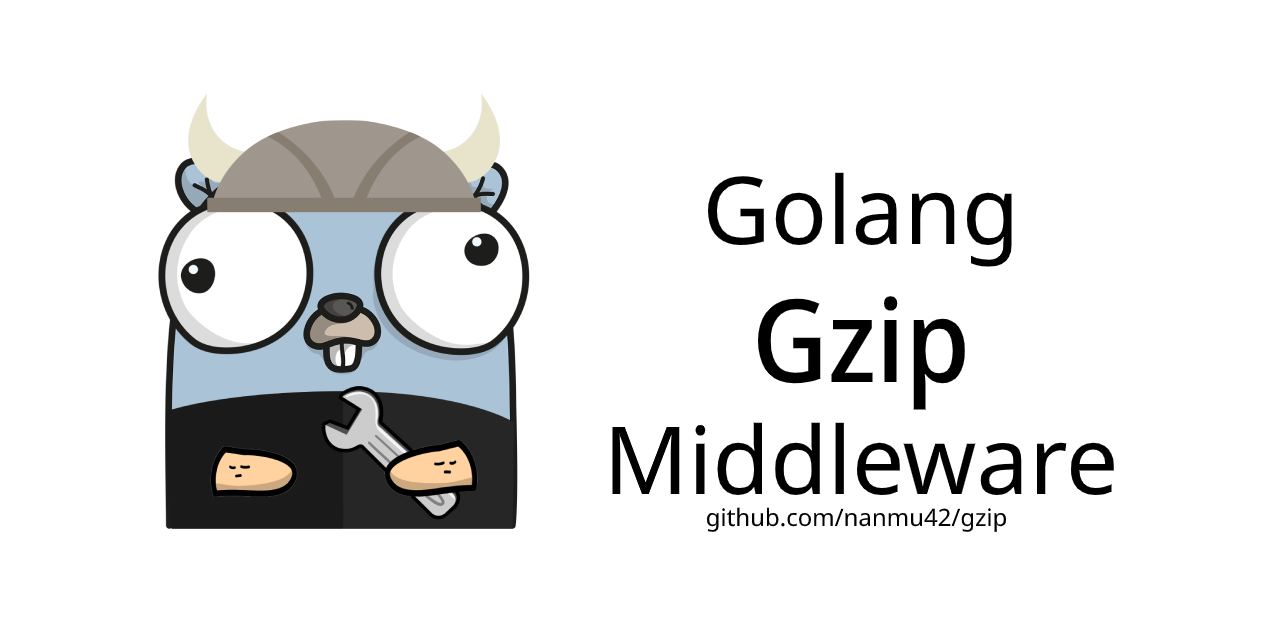143 lines
5.2 KiB
Markdown
143 lines
5.2 KiB
Markdown
**English** | [中文](https://github.com/nanmu42/gzip/blob/master/README.Chinese.md)
|
|
|
|
# Gzip Middleware for Go
|
|
|
|
[](https://godoc.org/github.com/nanmu42/gzip)
|
|
[](https://github.com/nanmu42/gzip/actions)
|
|
[](https://codecov.io/gh/nanmu42/gzip)
|
|
[](https://github.com/nanmu42/gzip/actions)
|
|
[](https://goreportcard.com/report/github.com/nanmu42/gzip)
|
|
|
|
An out-of-the-box, also customizable gzip middleware for [Gin](https://github.com/gin-gonic/gin) and [net/http](https://golang.org/pkg/net/http/).
|
|
|
|

|
|
|
|
# Examples
|
|
|
|
Use `DefaultHandler()` to create a ready-to-go gzip middleware.
|
|
|
|
## Gin
|
|
|
|
```go
|
|
import github.com/nanmu42/gzip
|
|
|
|
func main() {
|
|
g := gin.Default()
|
|
|
|
// use default settings
|
|
g.Use(gzip.DefaultHandler().Gin)
|
|
|
|
g.GET("/", func(c *gin.Context) {
|
|
c.JSON(http.StatusOK, map[string]interface{}{
|
|
"code": 0,
|
|
"msg": "hello",
|
|
"data": fmt.Sprintf("l%sng!", strings.Repeat("o", 1000)),
|
|
})
|
|
})
|
|
|
|
log.Println(g.Run(fmt.Sprintf(":%d", 3000)))
|
|
}
|
|
```
|
|
|
|
## net/http
|
|
|
|
```go
|
|
import github.com/nanmu42/gzip
|
|
|
|
func main() {
|
|
mux := http.NewServeMux()
|
|
mux.HandleFunc("/", func(w http.ResponseWriter, r *http.Request) {
|
|
writeString(w, fmt.Sprintf("This content is compressed: l%sng!", strings.Repeat("o", 1000)))
|
|
})
|
|
|
|
// wrap http.Handler using default settings
|
|
log.Println(http.ListenAndServe(fmt.Sprintf(":%d", 3001), gzip.DefaultHandler().WrapHandler(mux)))
|
|
}
|
|
|
|
func writeString(w http.ResponseWriter, payload string) {
|
|
w.Header().Set("Content-Type", "text/plain; charset=utf8")
|
|
_, _ = io.WriteString(w, payload+"\n")
|
|
}
|
|
```
|
|
|
|
## Customize Handler
|
|
|
|
Handler can be customized using `NewHandler` and `Config`:
|
|
|
|
```go
|
|
import github.com/nanmu42/gzip
|
|
|
|
handler := gzip.NewHandler(gzip.Config{
|
|
// gzip compression level to use
|
|
CompressionLevel: 6,
|
|
// minimum content length to trigger gzip, the unit is in byte.
|
|
MinContentLength: 1024,
|
|
// RequestFilter decide whether or not to compress response judging by request.
|
|
// Filters are applied in the sequence here.
|
|
RequestFilter: []RequestFilter{
|
|
NewCommonRequestFilter(),
|
|
DefaultExtensionFilter(),
|
|
},
|
|
// ResponseHeaderFilter decide whether or not to compress response
|
|
// judging by response header
|
|
ResponseHeaderFilter: []ResponseHeaderFilter{
|
|
NewSkipCompressedFilter(),
|
|
DefaultContentTypeFilter(),
|
|
},
|
|
})
|
|
```
|
|
|
|
`RequestFilter` and `ResponseHeaderFilter` are interfaces.
|
|
You may define one that specially suits your need.
|
|
|
|
# Performance
|
|
|
|
* When response payload is small, the handler is smart enough to skip compression automatically, which takes neglectable overhead.
|
|
* At the time when the payload is big enough, gzip kicks in and there is a reasonable price.
|
|
|
|
```
|
|
$ go test -benchmem -bench .
|
|
goos: linux
|
|
goarch: amd64
|
|
pkg: github.com/nanmu42/gzip
|
|
BenchmarkSoleGin_SmallPayload-4 4104684 276 ns/op 64 B/op 2 allocs/op
|
|
BenchmarkGinWithDefaultHandler_SmallPayload-4 1683307 707 ns/op 96 B/op 3 allocs/op
|
|
BenchmarkSoleGin_BigPayload-4 4198786 274 ns/op 64 B/op 2 allocs/op
|
|
BenchmarkGinWithDefaultHandler_BigPayload-4 44780 27636 ns/op 190 B/op 5 allocs/op
|
|
PASS
|
|
ok github.com/nanmu42/gzip 6.373s
|
|
```
|
|
|
|
Note: due to [an awkward man-mistake](https://github.com/nanmu42/gzip/pull/3#issuecomment-735352715), benchmark of and before `v1.0.0` are not accurate.
|
|
|
|
# Limitation
|
|
|
|
* You should always provide a `Content-Type` in http response's header, though handler guesses by `http.DetectContentType()`as makeshift;
|
|
* When `Content-Length` is not available, handler may buffer your writes to decide if its big enough to do a meaningful compression. A high `MinContentLength` may bring memory overhead, although the handler tries to be smart by reusing buffers and testing if `len(data)` of the first `http.ResponseWriter.Write(data []byte)` calling suffices or not.
|
|
|
|
# Status: Stable
|
|
|
|
All APIs are finalized, and no breaking changes will be made in the 1.x series of releases.
|
|
|
|
# Acknowledgement
|
|
|
|
During the development of this work, the author took following works/materials as reference:
|
|
|
|
* https://github.com/caddyserver/caddy/tree/master/caddyhttp/gzip (Apache License 2.0)
|
|
* https://github.com/gin-contrib/gzip (MIT License)
|
|
* https://blog.cloudflare.com/results-experimenting-brotli/
|
|
* https://support.cloudflare.com/hc/en-us/articles/200168396-What-will-Cloudflare-compress-
|
|
|
|
This package uses [klauspost's compress package](https://github.com/klauspost/compress) to handle gzip compression.
|
|
|
|
Logo generated at [Gopherize.me](https://gopherize.me/).
|
|
|
|
# License
|
|
|
|
```
|
|
MIT License
|
|
Copyright (c) 2019 LI Zhennan
|
|
|
|
Caddy is licensed under the Apache License
|
|
Copyright 2015 Light Code Labs, LLC
|
|
``` |